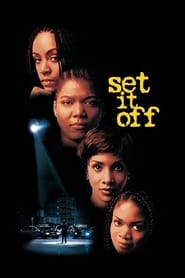There's a brief moment about five minutes before the end of Set It Off that succinctly captures the movie in a number of ways. In this sequence, we are shown live footage from CNN of the police pursuing and ultimately killing Cleo, with a reporter seemingly providing off-the-cuff commentary:
We've just had a horrible moment here. This is the most... our greatest fear for what would happen today. This is the most tragic culmination of the day's events.
I focus on this for at least three reasons. Firstly, the commentary is an entirely unnecessary instruction for the audience on how it should feel in the moment because we obviously already know that this is "the most tragic culmination of the day's events" — viewers silently transpose "the day's events" with "the film's plot". Moreover, there is no sense on the diegetic level of the "double satisfaction of participating vicariously in the gangster's sadism and then seeing it turned against the gangster himself." Indeed, there are many parts of the film, where, for all of its sociological angles that set it aside from other heist movies, Set It Off seemingly doesn't trust the audience to come to their own conclusions, even though the viewer has no real choice but to sympathise with Cleo et al. The score is doing similar work in other scenes, particularly when Stony is admiring all of the money, but the movie is run through with these odd and quite superfluous emotional guard rails.
Secondly, the episode shows how the film casually assumes that of course TV would be broadcasting this life from a helicopter. It is therefore another "peak 90s" element of the film — it's not just that this embedded footage is designed to evoke O. J. Simpson's famous televised car chase in June 1994, but the whole movie is entirely bouncing itself off Clinton-era social conservatism — at the very least, the whole film is a riposte to the "welfare queen" discourse of that administration.
Next, note that the white newsreader does not evince any obvious malice towards Cleo, a Black woman, and therefore is yet another example of where the film's casting is crucial to its position on that ol' chestnut for the Left — race vs. class. The other casting decisions I'm thinking of here are the Black social worker and the Black waitress whom the team jilt on their diner bill. Switch the races of any of these characters, and the racial politics of the film would be, I argue, markedly different. The bizarre Pretty Woman-esque subplot between Stony seems obviously related to this as well, although this is so half-heartedly integrated that it's difficult to analyse beyond seeing him as an obviously contradictory "look, we're normalising wealthy Blacks... as CEOs of multinational banks!" Mind you, this isn't the only thread that gets dropped — whilst the hilarious Godfather parody doesn't need to cohere with the rest of the film, Set It Off neatly sets up the idea that the gang always throws the naff CDs out of the window of the cars they steal, the cops never use that to trace them.
Moreover, the scene inadvertently reveals the outer limits of the movie's sociological critique. From the vantage point of today and a general understanding of mass spectatorship (and the role of the media in feeding our inner desires), it seems blindingly obvious to me that the death of this Black woman was not at all the "greatest fear for what would happen", but rather the greatest wish for what would happen, both for a hypocritical CNN and for a voyeuristic audience. Nobody who saw how the clips of George Floyd (etc.) were distributed and commented on can come to any other conclusion here, surely.
Lastly, is it just me, or does "This is the most tragic culmination of the day's events" have an almost "Go hence to have more talk of these sad things" construction to its placement and grammar?
Anyway, Set It Off was certainly more fun than Spike Lee's Inside Man (2006), and is probably more deft in its juggling of the task of being both a piece of mass entertainment and a piece of societal criticism. Yet what's missing from the 'heist' element of its genre stylings is that there is woefully little planning by the four girls. One element of what makes watching heist and escape films so enjoyable is the viewer's vicarious pleasure in watching a team planning the job in advance. For example, nobody can watch Jacques Becker's Le Trou (1960) without wanting (almost) to be in prison and escaping amongst such a well-oiled team. By contrast, however, Set It Off seems to relish that the girls do no planning at all, and, indeed, actually act entirely rashly and, at times, frankly irrationally. Why? The cocking of large calibre firearms, even when performed by Queen Latifah, is no substitute for the homosocial gratification of getting a team together and planning the heist.

